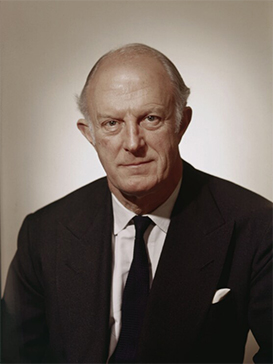Fitzroy MacLean
(diplomat, soldier, politician, spook) | ||||||||||||
|---|---|---|---|---|---|---|---|---|---|---|---|---|
 | ||||||||||||
| Born | 11 March 1911 Cairo, Egypt | |||||||||||
| Died | 15 June 1996 (Age 85) Hertford, England | |||||||||||
| Nationality | Scottish | |||||||||||
| Alma mater | Eton, King's College (Cambridge) | |||||||||||
| Children | 2 | |||||||||||
| Spouse | Veronica Nell Fraser-Phipps | |||||||||||
| Founder of | Hakluyt & Company Ltd | |||||||||||
| Party | Conservative | |||||||||||
| ||||||||||||
Sir Fitzroy MacLean was a British diplomat, soldier and politician.[1]
Hakluyt & Company Ltd
In 1995 Sir Fitzroy Maclean was appointed as founding chair of the Hakluyt Foundation, a supervisory board for the spy company Hakluyt. He was an intrepid explorer himself who was parachuted into Yugoslavia in the Second World War to act as the Allies' main link with Tito, the partisan leader and subsequent Communist boss.
Intelligence Newsletter reports:
- The man who largely invented modern-day business intelligence at Lund university in Sweden, Steven Dedijer, has just finished a study of British intelligence in which he notes that the famous writer Fitzroy MacLean, who died in June of this year, founded a firm named Hakluyt & Company in London in 1995. Dedijer, who has lived for the past few years in Dubrovnik, claims to have watched MacLean's career between 1937 and 1995 and says he "acted all his life following the best British tradition dating from the 16th century as an independent intelligence operator working informally but effectively for and within the British establishment's power network." He claims that Maclean had a foot in the intelligence world since he attended Stalin's terror trials in 1937 as a member of the Foreign Office to Mikhail Gorbachev's time — he advised Margaret Thatcher to back him — and to the war in former Yugoslavia, in which he was in close contact with Gen. Michael Rose. Dedijer said MacLean's decision to create a company which bears the name of a 16th century economist, whom Dedijer considers a specialist of economic intelligence, is particularly significant and mirrors the recent change in intelligence priorities, even within the British establishment.
- In addition to MacLean, the founders of the highly discreet Hakluyt & Company are George Jellicoe (Earl), who was head of a committee to reform intelligence and security under the Thatcher government and is now president of the Royal Geographic Society; and Brian Cubbon, former permanent secretary at the Home Office who was a candidate in 1987 to head the Secret Service.[2]
The Financial Times reports:
- Sir Fitzroy Maclean, the former diplomat and Tory minister whose finest hour was probably leading the British military mission to Yugoslav partisans during the second world war, has taken on a new task, as president of the Hakluyt foundation.
- It's a new, privately-funded body, established to give British companies the inside information they need when contemplating big ventures in foreign countries. Named after the Elizabethan promoter and chronicler of overseas exploration, the foundation will use a network of contacts to tell companies what's really going on in a foreign country, and who the key political players are. Its directors include Sir Brian Cubbon, a former permanent secretary at the home office and Northern Ireland Office.
- Perhaps its nearest equivalent is the Kissinger Foundation, set up by Henry Kissinger to help US businesses and organisations. Maclean, a highly active 84-year-old who has just brought out yet another book on Scotland, is one of those people who knows everyone, on both sides of the Atlantic.[3]
War Criminals
After World War 2, British intelligence was retaining a large number of anti-Communist prisoners under orders from Churchill, with the intention of reviving anti-Soviet operations.[4] One of the agreements of the 1945 Yalta Conference was that the western Allies would return all Soviet citizens who found themselves in their zones to the Soviet Union. The 14th Waffen Grenadier Division, which was recruited from Ukrainians in Galicia were not repatriated, ostensibly because Galicia had belonged to Poland prior to September 1939, but in reality because MI6 wished to use the prisoners in future operations.[5]
The officer in charge of screening the 14th Division for war criminals, Fitzroy Maclean, admitted in an interview in 1989 that it was "fairly clear that there was every probability that there were war criminals amongst them", but argued that in the context of the Cold War, such men were needed to fight against the Soviet Union.[6] On 23 March 1947, the United Kingdom granted asylum to the entire 14th Division, whose men were subsequently settled in the United Kingdom, Canada and Australia. The Soviet government protested against this decision, stating that most of the men in the division had previously served in German police units in Galicia and were deeply involved in perpetrating war crimes, but using a brief written by Pavlo Shandruk, an officer in the division as its basis, the Foreign Office issued a statement denying the 14th division had been involved in war crimes.[7]
References
- ↑ Frank McLynn, Sir Fitzroy Maclean Bt: Obituary, Independent, 19 June 1996.
- ↑ Fitzroy MacLean's Legacy, Intelligence Newsletter, October 17, 1996.
- ↑ Forward charge, Financial Times, 11 August 1995.
- ↑ https://archive.org/details/maskoftreachery00cost
- ↑ Dorril, Stephen (2002). MI6: Inside the Covert World of Her Majesty's Secret Intelligence Service (reprint ed.). Simon and Schuster. ISBN 978-0-743-21778-1. page 203-204
- ↑ Dorril 2002, p. 204.
- ↑ Dorril, Stephen (2002). MI6: Inside the Covert World of Her Majesty's Secret Intelligence Service (reprint ed.). Simon and Schuster. ISBN 978-0-743-21778-1. page 205